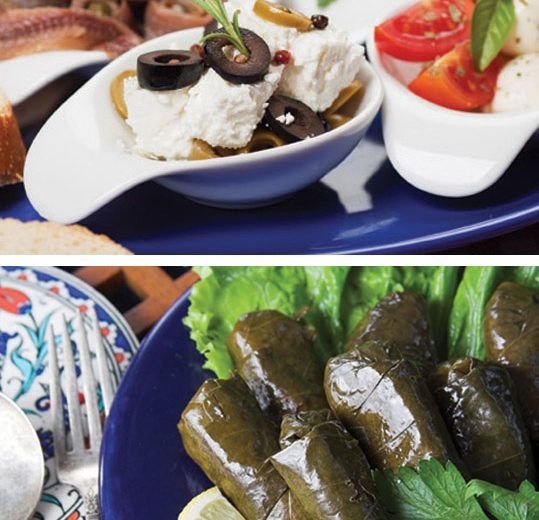
Known for one of the healthiest culinary cultures in the world, Greece once served as a model for the Mediterranean diet.
Traditional breakfast was a simple meal, such as herbal tea with dried bread (paximadi) and cheese. Lunch, featuring vegetable casseroles (ladera) or legumes prepared with tomato, onion, garlic, and herbs and spices and accompanied with feta cheese and bread, was the largest meal of the day—while dinner was something light such as yogurt with fruit.
Another hallmark Greek food was savory pies (pites), usually filled with greens and cheese. Meat was less common not only because it was expensive, but because the Greek Orthodox religion requires 180 days of fasting a year—a fast that prohibits animal products. Fish preparation varied according to region: cured or salted in mainland Greece, fresh on the islands. Probiotic-rich yogurt and cheese from sheep and goat milk were the main sources of dairy, and condiments such as garlic, oregano and lemon offered antioxidants.
Greeks historically had low rates of chronic disease and the highest life expectancy rates in the Western world—health measures that became associated with the Mediterranean diet—but today, urbanization and economic growth have changed the dietary patterns of this country. While they still have a very high consumption of vegetables and olive oil, they are also eating more processed foods.
Whereas Greeks once had the highest life expectancy in the Western world, heart disease is now the leading cause of death and obesity has become a major public health issue. In addition, type 2 diabetes is on the rise, with about 10% of the population sufferingfrom the disease.
In 1993, Oldways, the Harvard School of Public Health and the European Office of the World Health Organization introduced the classic Mediterranean Diet, which was based on the diet of Greece, Crete and Southern Italy circa 1960. In 2009, Oldways launched Mediterranean Diet Month (celebrated in May) so dietitians around the world could build awareness of the foods and health benefits associated with the Mediterranean Diet.
In Greece, most dietitians are in private practice, as is common for many health professionals. Dietitians also have gained recognition within the community; they are members of the National Nutrition Committee of the Ministry of Health, participate in the medical team in many clinical settings, and are considered a respected source of nutrition information for the media—all of which helps in the task of persuading the public to return to plant-based foods, healthy fats and nutritious meal plans for benefits that have long been associated with their native diet.



